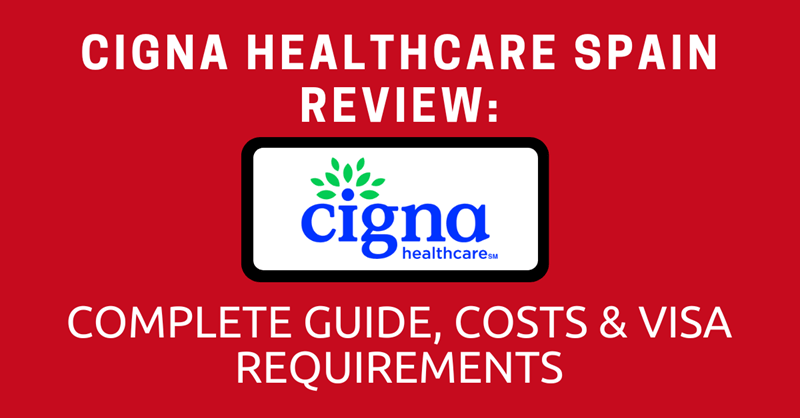
This article will take approximately 21 minutes to read. Don't have the time right now? No worries. Email the ad-free version of the article to yourself and read it later!
Planning to buy private health insurance in Spain? Find out if Cigna Healthcare is the right insurance for expats. I’ll break down plan options, costs, pros and cons, visa compliance, and more.
As an expat in Spain, you might be wondering why you should get private insurance when public healthcare here is among the best in the world. In fact, WHO often lists Spain’s public healthcare system, or Sistema Nacional de Salud (SNS), among the top public health systems globally.
But no insurance system is perfect. While it’s a good system, it still suffers from long waiting times and a lack of English support. For example, you might need to wait a month just to see a specialist for a non-emergency case. Also, some people can’t access the SNS.
This is where private insurance comes into play: the waiting time is short, English support is available, and you can visit any private hospital you want. And Cigna Healthcare is among the popular choices for expats in Spain.
In this article, I’m going to fully review Cigna Healthcare by breaking down all the plans, pros, cons, costs, and more. At the end of the review, you can make your own informed decision about whether Cigna Healthcare is right for you.
Disclaimer: This article may include links to products or services offered by ExpatDen's partners, which give us commissions when you click on them. Although this may influence how they appear in the text, we only recommend solutions that we would use in your situation. Read more in our Advertising Disclosure.
Contents
- Key Takeaways
- Who’s Cigna Healthcare
- Why Expats in Spain Choose Cigna Healthcare?
- Core Insurance Plans
- Which Plan Should You Get?
- Cigna Healthcare Plan Comparison for Expats in Spain
- Optional Add-Ons
- Area of Coverage
- Out-of-Area Emergency Coverage
- Exclusions
- Waiting period
- How to Use Cigna Healthcare in Spain
- Case Management Service
- How to Contact Cigna Healthcare
- Cost of Cigna Healthcare in Spain
- What’s the Main Downside of Cigna Healthcare in Spain?
- Who Should Get Cigna Healthcare in Spain?
- Cigna vs Spain Public Insurance
- Cigna vs Spain Local Private Insurance
- Cigna vs Other International Insurance Providers
- Frequently Asked Questions
- How long does approval take?
- Does Cigna Healthcare meet Spanish visa insurance requirements?
- What Are the Monthly Costs of Cigna Healthcare in Spain?
- How many hospitals are in the network?
- Can I use Cigna Healthcare right after I arrive in Spain?
- What if I go to a non-partner hospital?
- Is prescription medication covered?
- Can I change my plan later?
- What if I have pre-existing conditions?
Key Takeaways
- If you want to get private insurance in Spain, Cigna Healthcare is a great option if you’re looking for a comprehensive plan with international coverage and English-speaking support.
- There are three plans available: Silver, Gold, and Platinum.
- The Silver plan, with an annual limit of US$1 million, is the most popular choice due to its balance of price and coverage.
- Another good option for expats in Spain is the Gold plan, which comes with an annual limit of US$2 million. It’s ideal for those who want to ensure their insurance covers serious conditions, including extended ICU stays.
- With Cigna Healthcare, you can visit almost any private hospital in Spain, including top-tier facilities like Hospital Ruber Internacional, Hospital Quirónsalud Barcelona, and Hospital Universitario HM Sanchinarro.
- Thanks to Cigna Healthcare’s wide network of partner hospitals, direct billing is available at most major hospitals in Spain, meaning you don’t have to pay upfront and claim reimbursement later.
- Prices for 40–49-year-olds range from around US$160/month (Silver) to US$420/month (Platinum), depending on your area of coverage and optional add-ons.
- If you’re interested, you can use this link to get a free quote.
Who’s Cigna Healthcare
Cigna Healthcare is an insurance company from the United States and is among the biggest insurance companies in the world. (If you are from the US, you would already be familiar with the name.)

They are especially known for international insurance (some may call it expat insurance). So, in short, they are a major player in the world of international insurance and totally legit.
Why Expats in Spain Choose Cigna Healthcare?
While Spain’s public healthcare system (SNS) is among the best in the world, there are five main problems with it:
- Long wait times for specialists and non-urgent surgery
- Limited English-speaking staff outside private hospitals. If you can’t speak Spanish, you may sometimes have communication problems
- You can’t choose a hospital yourself
- You need private health insurance if you are on a non-lucrative visa (such as investor, retiree, digital nomad, student, and so on)
- Some people need private health insurance while waiting for the SNS
So, if you need private insurance for whatever reason, there are some points where Cigna Healthcare stands out. Based on what I’ve gathered, they are:
- Recognized by Spanish immigration. Since Cigna Healthcare is a well-known company, when a Spanish immigration officer sees that you have Cigna Healthcare as your health insurance, they will accept it. Cigna Healthcare also meets the required insurance criteria (e.g., full coverage, no waiting periods, and so on)
- Visit any leading hospitals in Spain. Insurance plans from Cigna Healthcare are comprehensive. With it, you can visit any private hospital in Spain, including top hospitals like Hospital Ruber Internacional, Hospital Quirónsalud Barcelona, or Hospital Universitario HM Sanchinarro
- Direct billing. Cigna Healthcare has partnered with a wide range of hospitals throughout Spain. The list is exhaustive. While I can’t list all the names, it seems that all popular private hospitals in Spain are their. This means they can do direct billing with Cigna Healthcare. You don’t need to pay upfront and request reimbursement later
- Choose a plan based on your budget. You can pick from three simple plan levels: Silver, Gold, and Platinum. There are also many optional coverage options. This gives you more control over your coverage and budget
- 24/7 support. This is a personal reason, but I quite like Cigna Healthcare’s support. They are available 24/7 and are known to be helpful. There are also many ways to contact them, via email, phone, or through their app. This makes it easy to reach them, especially in an emergency.
All in all, if you are looking for a comprehensive health insurance plan in Spain, Cigna Healthcare ticks all the boxes.
However, the only downside I’ve seen is the price. They are not the cheapest option on the market. In fact, they can even be slightly more expensive than other insurers with similar coverage. But what you get in return is convenience, peace of mind, and a comfortable experience when you need to visit a hospital in Spain.
Oh, and they also provide a telemedicine service. This simply means you can consult with their doctors online and get prescribed medications. The doctor can also connect you with a hospital in Spain if needed.
Core Insurance Plans
Cigna Healthcare has three main plans available: Silver, Gold, and Platinum. All of the plans come with worldwide coverage.
Silver Plan
- US$1 million annual coverage limit
- Private room for inpatient stays
- Covers hospitalization, surgeries, cancer treatment, and ICU
- Basic mental health care (up to US$5,000 per year)
- Doesn’t include maternity
- US$15,000 for outpatient coverage (optional coverage)
If you want to buy Cigna Healthcare, the Silver plan is the one I recommend. The US$1,000,000 coverage limit is often enough even if you visit one of the best private hospitals in Spain, like premium hospitals such as Clínica Universidad de Navarra or Hospital Quirónsalud Madrid.
In addition, the US$15,000 limit on outpatient coverage is also generally sufficient.
There are three main reasons I’ve seen that you may want to choose a higher plan than the Silver plan:
- You need higher coverage limits. For example, if you are hospitalized in the ICU for months or need to visit a top-tier hospital every month, the Silver plan’s limit may not be enough
- You need maternity coverage, since it’s not included in this tier
- You plan to use insurance in a country with more expensive healthcare, like the US or Switzerland
Gold Plan
- US$2 million annual coverage limit
- Covers maternity care and newborn care
- Generally higher limits across all categories
- US$35,000 outpatient coverage (optional coverage)
If you want to make sure that the insurance covers everything, including months of hospitalization, then you should aim for the Gold plan. The outpatient coverage should also be enough even if you visit a hospital every month.
The plan now also includes maternity coverage, which is good if you are planning to have a baby in Spain.
Platinum Plan
- Unlimited annual coverage
- Unlimited outpatient coverage (optional coverage)
Personally, this plan is overkill. While it comes with unlimited coverage, the US$2,000,000 annual limit provided by the Gold plan is generally enough for most scenarios. That said, in my opinion, most expats in Spain (or anywhere in the world) won’t need unlimited coverage.
Which Plan Should You Get?
In my opinion, the Silver plan is generally suitable for many expats in Spain. If you need higher coverage or plan to have kids, go with the Gold plan. The Platinum plan can be overkill.
Cigna Healthcare Plan Comparison for Expats in Spain
| Feature / Plan | Silver | Gold | Platinum |
| Annual Limit | US$1,000,000 | US$2,000,000 | Unlimited |
| Geographic Coverage | Worldwide (area selectable) | Worldwide (area selectable) | Worldwide (area selectable) |
| Hospital Room Type | Private | Private | Private |
| Hospitalization (Inpatient) | Yes | Yes | Yes |
| Outpatient Care | Optional Add-on | Optional Add-on | Optional Add-on |
| Mental Health Coverage | Yes (Basic: up to US$5,000) | Yes (Enhanced: up to US$10,000) | Yes (Maximum: up to 90 days) |
| Maternity Coverage | No | Yes (with optional add-on) | Yes (with optional add-on) |
| Newborn Care | No | Yes (US$25,000 limit) | Yes (up to US$156,000) |
| Road and Air Ambulance | Yes | Yes | Yes |
| Telehealth Consultations | Yes | Yes | Yes |
| Best For | Most expats in Spain | Those who need higher coverage or plan to have a baby | High-net-worth individuals who want unlimited coverage |
Optional Add-Ons
Optional Add-ons are available from the Silver plans and above. Depending on your situation, some of these extras might be worth it.
1. International Outpatient
This covers things like doctor visits, prescriptions, tests, and treatment that don’t require a hospital stay.
| Benefit | Silver | Gold | Platinum |
| Annual outpatient limit | $15,000 | $35,000 | Paid in full |
| Doctor consultations | $2,500 | $7,500 | Paid in full |
| Prescribed meds & dressings | $1,500 | $4,500 | Paid in full |
| Lab tests & diagnostics | $2,500 | $5,000 | Paid in full |
| Rehab (physio, etc.) | $5,000 | $15,000 | Paid in full |
Do I need it? Yes, you need it if you want to use Cigna Healthcare to apply for your Spain visa.
2. Vision & Dental
This covers eye exams, glasses, cleanings, fillings, and bigger dental procedures like crowns and braces.
| Benefit | Silver | Gold | Platinum |
| Eye exam (1 per year) | $100 | $200 | Paid in full |
| Glasses/contacts | $155 | $155 | $310 |
| Dental limit per year | $1,250 | $2,500 | $5,500 |
| Cleanings/checkups | Yes | Yes | Yes |
| Major dental work | 70% refund | 80% refund | Full refund |
| Braces (under 18) | 40% refund | 50% refund | 50% refund |
Note: there’s a waiting period of 3–18 months for major treatments
Do I need it?: No, this one is just totally optional.
3. Health & Wellbeing
This is for regular checkups, cancer screenings, counseling sessions, and wellness coaching.
| Benefit | Silver | Gold | Platinum |
| Annual checkup | US$325 | US$650 | US$2,000 |
| Cancer screenings | US$325 each | US$650 each | Paid in full |
| Mental health support (CBT) | 20 sessions | 20 sessions | 20 sessions |
| Wellness coaching | Yes | Yes | Yes |
| Footcare (podiatry) | 5 sessions | 10 sessions | 15 sessions |
| Dietician consultations | Up to 4 | Up to 4 | Paid in full |
Do I need it?: If you are prone to mental health issues or don’t want to miss a health check-up (since you’re already paying for it through your insurance), then you should get it.
4. Evacuation & Crisis Assistance
This gives you backup in case of serious emergencies or if you need to be flown to another country for treatment.
| Benefit | Silver | Gold | Platinum |
| Medical evacuation | Yes | Yes | Yes |
| Medical repatriation | Yes | Yes | Yes |
| Return of mortal remains | Yes | Yes | Yes |
| Companion travel (per trip) | US$1,200 | US$1,200 | US$1,200 |
| Living allowance (10 days max) | US$155/day | US$155/day | US$155/day |
| Crisis Assistance Plus™ | Yes | Yes | Yes |
Do I need it?: In general, no, you don’t need it. The core plan already includes a road and air ambulance. Also, healthcare coverage throughout Spain is quite good. The only exception is if you’re an adventurer and plan to travel to a remote country regularly.
Area of Coverage
When you sign up for a Cigna Healthcare plan, you have two main options:
- Worldwide, excluding the USA: With this option, you’re covered in Spain, the rest of Europe, and pretty much anywhere in the world except the United States.
- Worldwide, including the USA: Choose this only if you want full coverage in the U.S., as it will significantly increase your premiums.
Out-of-Area Emergency Coverage
It’s also good to know that if you choose “Worldwide, excluding the USA,” you still get emergency coverage in the U.S. For example, the Silver plan covers you up to US$100,000 for emergency outpatient treatment. But it’s for emergencies only, such as after an accident.
Exclusions
The list of exclusions for Cigna Healthcare plans is common among private health insurance providers. You won’t be covered for things like:
- Cosmetic procedures (e.g., nose jobs or Botox) unless medically necessary
- Self-inflicted injuries
- Pre-existing conditions, except for certain conditions listed below
Good to know: However, when it comes to pre-existing conditions, Cigna Healthcare is quite generous. They helps you maintain pre-existing conditions that may not be included by other providers, such as:
- Hypertension
- Type 2 diabetes
- Glaucoma
- Arthritis, joint or back pain
- Osteoporosis / osteopenia
Tip: When applying for Cigna Healthcare, I recommend that you declare your full medical history. If you hide it and they find out later, they may deny your claim. This tip also applies to other insurance providers.
Waiting period
You can use your Cigna Healthcare plan right away, except for treatments with standard waiting periods like:
- Maternity: 12 months
- Dental and optical: depends on the plan
How to Use Cigna Healthcare in Spain
It’s quite easy to use Cigna Healthcare in Spain (and other parts of the world).
- You can use their telehealth service and talk to a licensed doctor within the same day. If it’s not serious, you can even get prescribed medications.
- You can go to a hospital right away, show your Cigna Healthcare card, and Cigna Healthcare should handle the rest with the hospital.
- In case it’s a serious condition (for example, if you’re diagnosed with cancer or something similar), I recommend contacting them first. This way, they can help find the right hospital or doctor for you. Doing so also ensures that you receive prior approval.
In case you need to pay first, such as for outpatient services, you can simply upload the medical receipts on their app and expect reimbursement within 5 working days.
Since health insurance from Cigna Healthcare is comprehensive and comes with high limits, you can visit any leading private hospital in Spain and expect your bill to be fully covered.
Case Management Service
One feature that makes Cigna Healthcare stand out from other insurance providers is their case management service. It’s also my favorite feature, especially because I know someone who was diagnosed with a brain tumor and had to handle everything on his own, even though he had insurance. This made an already stressful situation even worse.
Cigna Healthcare is different. If you’re diagnosed with a complex condition like cancer, a serious injury, or a long-term illness, they assign a dedicated nurse or doctor to guide you through your entire treatment. They will:
- Act as your single point of contact
- Help you understand your options
- Coordinate with hospitals, specialists, and labs
- Make sure your care is smooth and stress-free
Real-life example: One Cigna Healthcare member in Europe was diagnosed with a brain tumor. The case manager helped them every step of the way, including making appointments, explaining treatments, and taking pressure off the family so they could focus on recovery.
If you have ongoing health issues like high blood pressure, diabetes, or heart problems, Cigna Healthcare also has a team to educate you and help plan your diet and medication routines.
How to Contact Cigna Healthcare
There are many ways you can contact them:
- 24/7 phone support, available in many languages including English, French, Spanish, German, and more
- App (FYI: not many insurance companies have an app that actually works—Cigna is one of them)
- Member portal on their website
Cost of Cigna Healthcare in Spain
Here’s the estimated price for the Cigna Healthcare Silver plan in Spain:
- Age 30 to 39: US$1,400 to US$3,800
- Age 40 to 49: US$1,900 to US$5,300
- Age 50 to 59: US$2,500 to US$6,900
There’s a wide range here because the plan is flexible and lets you customize it based on your area of coverage, optional add-ons, deductible, cost share, and more.
To bring the premium down, you can adjust the deductible (from US$0 up to US$10,000) and choose a cost-share option (10%, 20%, or 30%). Just make sure to double-check your visa requirements. Spanish authorities might not accept plans with high deductibles or cost-share options.
The best way to get an exact quote is to fill out this form on Cigna Healthcare’s website. It takes just a few minutes. You can also speak with a Cigna Healthcare representative directly if you have any questions or want to buy the plan.
What’s the Main Downside of Cigna Healthcare in Spain?
The biggest downside of Cigna Healthcare is the price. It’s not the cheapest option out there. If you don’t need coverage outside of Spain and are fine with visiting standard private hospitals, local insurance can be more affordable.
On the other hand, if you have the budget and want international coverage, good customer service, and a support team that truly helps when you’re sick, Cigna Healthcare is a solid choice.
Who Should Get Cigna Healthcare in Spain?
In my opinion, Cigna Healthcare is a great fit if you:
- Need insurance for your Spain visa and want to make sure it’s accepted without any issues
- Just moved to Spain and don’t have access to the public healthcare system (SNS) yet
- Prefer private hospitals and want faster access, English-speaking doctors, and less paperwork
- Have a family and want maternity, dental, and outpatient benefits all in one place
- Travel often and want international coverage
If you’re considering Cigna Healthcare, you can get a free quote and start your application using this link.
Cigna vs Spain Public Insurance
Spain’s public healthcare system (SNS) is one of the best in Europe. It basically provides free healthcare to anyone in the system (paid through taxes). However, there are some issues with it:
- You can only go to a hospital that’s assigned to you
- You’ll deal mostly in Spanish
- Long wait times for non-emergency treatments
- Not everyone qualifies for it
- Even if you qualify, it can take months before you can apply
On the other hand, anyone can get Cigna Healthcare, and you can use it at any English-speaking private hospital right away, without a waiting period (except for certain treatments like maternity). Cigna Healthcare also meets the health insurance requirements for Spain’s visa.
Cigna vs Spain Local Private Insurance
Local private insurance in Spain, like Sanitas, Adeslas, or DKV, are more affordable than Cigna. They’re a good option if you want budget-friendly insurance and only need coverage within Spain. However, you’ll likely need to speak some Spanish, and the hospital networks are usually smaller compared to international plans.
Cigna vs Other International Insurance Providers
When comparing Cigna Healthcare with other global insurers like Allianz, Bupa, AXA, or IMG, the differences come down to your needs. Cigna Healthcare is known for flexible plans and strong case management support when you’re sick. IMG is often cheaper, but it usually comes with higher deductibles and lower coverage limits.
Frequently Asked Questions
Here’s a list of frequently asked questions about Cigna Healthcare.
How long does approval take?
In general, Cigna Healthcare takes around 5 to 10 business days to process your application after submission. So, if you need it for your visa, plan ahead. If you’re in a rush, let them know during the application process, and they may be able to speed things up.
Fun fact: Based on my conversations with various brokers and insurance providers, most people take around 2 to 3 months to decide and buy insurance.
Does Cigna Healthcare meet Spanish visa insurance requirements?
Yes. The Silver, Gold, and Platinum plans all meet the Spanish visa requirements. They cover at least €30,000 in medical expenses, include emergency treatment with no waiting period, and provide repatriation coverage. Spanish immigration officers are also very familiar with Cigna Healthcare.
What Are the Monthly Costs of Cigna Healthcare in Spain?
If you’re in the 40 to 49 age range, here’s a breakdown of the estimated monthly premiums for Cigna Healthcare plans in Spain. It’s hard to give an exact number since the price varies based on your age, the plan you choose, your area of coverage (with or without the U.S.), deductible, and any optional add-ons.
That said, here’s the average monthly cost you can expect as a 40-year-old:
- Silver Plan: ~US$160 to US$230 per month
- Gold Plan: ~US$220 to US$320 per month
- Platinum Plan: ~US$300 to US$420 per month
How many hospitals are in the network?
Cigna Healthcare has over 2 million hospitals and healthcare providers worldwide and more than 1,000 hospitals across Spain. This includes top private hospitals like Quirónsalud (50+ locations), HM Hospitales, and clinics in the Sanitas network.
Can I use Cigna Healthcare right after I arrive in Spain?
Yes. Your coverage starts on the policy start date, which can be the day you arrive. Emergency and urgent care are covered from day one. You can choose your start date when submitting your application.
What if I go to a non-partner hospital?
You can still get treatment, but you’ll need to pay upfront and then file a claim. Cigna Healthcare usually reimburses you within 5 working days after they have all documents from you.
Is prescription medication covered?
Yes, if you add outpatient coverage. Here’s what’s included:
- Silver: up to US$1,500 per year
- Gold: up to US$4,500 per year
- Platinum: full coverage
Can I change my plan later?
Yes, but usually only during the renewal period. You may also be able to change midyear if you experience a major life event such as getting married, having a baby, or changing jobs.
What if I have pre-existing conditions?
Cigna Healthcare often accepts common conditions like high blood pressure and diabetes, as mentioned earlier. That said, if you have pre-existing conditions, it’s best to discuss everything with them in writing so you know exactly what is and isn’t covered.
Disclaimer:
This article is based on my in-depth research and discussions with various brokers. I’m also quite familiar with international insurance like Cigna Healthcare, having reviewed over 30 health insurance plans so far. That said, mistakes can still happen, and coverage details may change over time without prior notice. So, it’s always best to read Cigna Healthcare’s policy in detail and speak with them directly if you have any questions.





